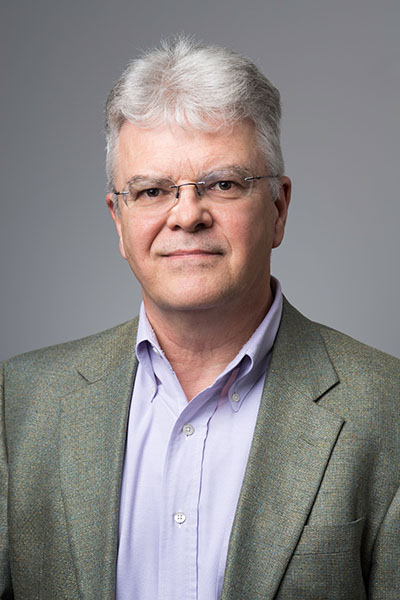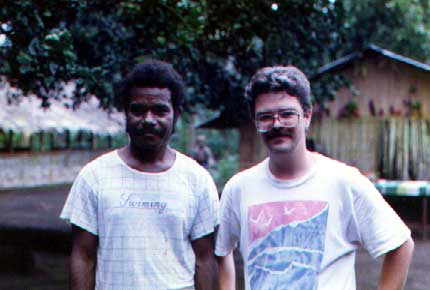
Robert J. Foster
Richard L. Turner Professor of Humanities
Professor of Anthropology and Visual and Cultural Studies
PhD, University of Chicago, 1988
- Office Location
- Humanities Center, 212E Rush Rhees Library
- Telephone
- (585) 275-8741
- Web Address
- Website
Office Hours: By appointment
Research Overview
Before coming to Rochester, Professor Foster taught in The College of the University of Chicago as a William Rainey Harper Postdoctoral Instructor. At the University of Rochester, he has served as Mercer Brugler Distinguished Teaching Professor and in 2008 he was awarded the Goergen Award for Distinguished Achievement and Artistry in Undergraduate Teaching. Professor Foster has an appointment in the Graduate Program in Visual and Cultural Studies in which he is a core faculty member. He has been a visiting professor at the Australian National University, Cambridge University and L’École des Hautes Études en Sciences Sociales in Paris.

Somanil Funil and Robert Foster, Tanga Islands, Papua New Guinea, 1992
Prof. Foster has done research in Papua New Guinea since 1984. His research has been supported by the U.S. Department of Education, the National Science Foundation, the Australian-American Educational Foundation, the American Council of Learned Societies, the Spencer Foundation and the National Endowment for the Humanities.
Research Interests: Political economy; material culture; globalization; corporations; commercial media; mobile phones; Papua New Guinea, Melanesia
Recent Projects:
1. A Cultural Biography of the P.G.T. Black Collection of Pacific Islands Artifacts
The Buffalo Museum of Science holds the oldest collection in North America of Pacific Islands artifacts put together by a single person. This project puts the P.G.T. Black Collection in the economic, political, and cultural contexts of its creation and display. The collection provides important clues about initial encounters between Pacific Islanders and European traders, missionaries, and colonial officials during the late nineteenth century. In the 1940's, display of objects from the collection at museum exhibits promoted acceptance of the idea of Primitive Art in the U.S.
For an overview of the collection, see my article "Notes for a Networked Biography: The P.G.T. Black Collection of Oceanic Things" [PDF]
2. The Moral and Cultural Economy of Mobile Phones in the Pacific (with Heather Horst)
Funded by the Australian Research Council (DP140103773), 2014-2019
The mobile phone represents one of the first truly global digital technologies (Goggin 2010). Spreading far beyond the industrialized centres of Europe, Asia and North America, almost 5 billion of the world’s 6 billion mobile phone subscriptions are found in the developing world. The rapid uptake of mobile phones in these regions has provided people with greater capacity for interpersonal communication and access to Web-based media platforms as well as new services such as banking and money transfers.
Our project seeks to understand this profound change by foregrounding the role of information and communication technologies in shaping the moral and cultural dimensions of socioeconomic life. We organize the research comparatively through case studies of two countries in the Pacific – Papua New Guinea, where a single service provider (Digicel Group Ltd.) now dominates the market, and Fiji, where the same provider struggles against a larger rival (Vodafone). Building upon the investigators’ extensive experience analysing the social, economic and cultural effects of mass media and new forms of communication in developing countries, the project will investigate how engagements with mobile phones and related digital media generate and regenerate cultural and personal identities; remake social practices including civic participation and economic exchange; and reconfigure relationships among consumers, companies and states. We focus on mobile money in particular as an emergent phenomenon that redefines relations among consumers, companies and states and that facilitates financial and social well-being in the developing world.
The project has three objectives:
(1) Describe, compare and explain how consumers appropriate mobile platforms and understand the moral dimensions of using these platforms in their everyday lives;
(2) Develop a nuanced historical and ethnographic account of the ways in which companies offering mobile services fashion themselves as moral actors through the cultivation and maintenance of mobile markets;
(3) Compare and analyse how different state actors create mobile markets through policies, regulatory frameworks and other forms of governance.
3. Series Editor, Tracking Globalization, Indiana University Press
How can globalization be understood and questioned-ethnographically, historically, theoretically? How do people imagine and act upon their place in the world? This series addresses these questions by tracing the shifting and uneven circulation of objects, images, and people. It focuses on the everyday lives of people materially connected by such circulation. Works in the series take multiple disciplinary approaches to the emerging methodological challenges of multi-sited research.
4. Lewis Henry Morgan @ 200: A Critical Appreciation
This project marked Lewis Henry Morgan’s (1818—1881) bicentennial by revisiting his various legacies, recovering and publicizing them while at the same time critically reevaluating them. We sponsored a set of related activities throughout the calendar year 2018, culminating in the autumn with three complementary public exhibits hosted by Rush Rhees Library, theRochester Museum & Science Center, and theRochester Public Library/Office of the City Historian.
Activities during the year included:
▸Offering a dedicated course (ANT 285/485 offered in fall 2017,spring 2018, and fall 2018 cross-listed with History).
▸Organizing a speaker and film series with venues on and off campus.
▸Developing related programming at local cultural institutions like the Rochester Public Library and Rochester Museum and Science Center.
▸Building this website and digital exhibit to document the project and furnish a durable resource for the project’s community partners as well as the University community.

The University of Rochester sits on land of the Onöndowa’ga:’ (Seneca) Nation ceded in 1788 according to the unjust and unredressed terms of the Phelps-Gorham Purchase. We acknowledge the sovereignty of the Onöndowa’ga:’ people and their continuing connections to this land.
Research Interests
- Political economy
- Material culture
- Globalization
- Corporations
- Commercial media
- Mobile phones
- Papua New Guinea, Melanesia
Selected Publications
Books
- Uneven Connections: A Partial History of the Mobile Phone in Papua New Guinea (2024)
- The Moral Economy of Mobile Phones: Pacific Islands Perspectives (2018)
- Art, Artifact, Commodity: Perspectives on the P.G.T. Black Collection (2017) [PDF]
- Coca-Globalization: Following Soft Drinks from New York to New Guinea (2008)
- Materializing the Nation: Commodities, Consumption and Media in Papua New Guinea (2002)
- Nation Making: Emergent Identities in Postcolonial Melanesia (1995)
- Social Reproduction and History in Melanesia: Mortuary Ritual, Gift Exchange and Custom in the Tanga Islands (1995)
Video Collaborations
Recent Articles
- Things to Do with Brands: Creating and Calculating Value
- Big Men and Business: Morality, Debt and the Corporation
- The Corporation in Anthropology [PDF]
- Customer Care
- The Future of Shareholder Activism
- The Politics of Media Infrastructure: Mobile Phones and Emergent Forms of Public Communication in Papua New Guinea
- "A Little Out of Temper": When Lewis Henry Morgan Met Abraham Lincoln
- Tenuous Connectivity: Time, Citizenship, and Infrastructure in a Papua New Guinea Telecommunications Network
Teaching
List of Past Courses
- ANT 101: Cultural Anthropology
- ANT 107: Doing Anthropology in Rochester
- ANT 202: Modern Social Theory
- ANT 204: Ethnographic Themes
- ANT 205: Theories and Debates in Anthropology
- ANT 226: Culture and Consumption
- ANT 228: Mobile Phones in the Developing World
- ANT 266: Global Culture/Anthropology of Globalization
- ANT 285/485: Research Colloquium: Lewis Henry Morgan Bicentennial
- ANT 301: The Mobile Phone
- ANT 306: The Corporation
Honors
- 2026 Visiting Fellow, Sainsbury Research Unit for the Arts of Africa, Oceania & the Americas, University of East Anglia
- 2025 Paul Mellon Senior Visiting Fellow, Center for the Advanced Study of the Visual Arts, National Gallery of Art, Washington DC
- 2023 Australian National University Vice-Chancellor’s Strategic Funds for Flagship Titles at ANU Press
- 2017 - 2019 University of Rochester Humanities Project Grant (L.H. Morgan at 200: A Critical Appreciation)
- 2014 - 2019 Australian Research Council Discovery Project Grant (with Heather Horst)
- 2013 Central New York Humanities Corridor Award, funded by the Andrew W. Mellon Foundation (with Marina Welker)
- 2011 - 2012 National Endowment for the Humanities Fellowship
- 2011 - 2012 American Council of Learned Societies Fellowship
- 2011 Wyse Visiting Professor, Department of Social Anthropology, University of Cambridge
- 2011 Visiting Fellow, Centre for Critical and Cultural Studies, University of Queensland
